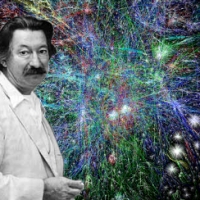Be Wary of Silicon Valley’s Guilty Conscience: on The Center for Humane Technology
2017 was a somewhat difficult year for the tech titans, and it looks as though those problems persist in 2018. Of course, the key term in the previous sentence is “somewhat.” After all, these companies continue growing in size, these companies continue exerting growing societal influence, the products from these companies continue to embed themselves in daily life, and these companies keep making their CEOs and investors richer. Nevertheless, in 2017 (and 2018), these companies found themselves being publicly scolded by angry lawmakers, disparaged by frustrated users, and talk that framed these companies as monopolies (and thus worth breaking up) began seeping into mainstream discourse.
And against this backdrop, what should emerge, but the Center for Humane Technology.
Concerned that “technology is hijacking our minds and society,” the Center for Humane Technology brings together a “world-class team of deeply concerned former tech insiders and CEOs” who “intimately” understand the problems facing society today.[1] While some of those involved in the group have been “raising awareness” for several years, the forming of the Center for Humane Technology, represents an important step in bringing this “world-class team” together under one shiny umbrella. The formation of the group has not gone unnoticed, and since announcing its formal formation the group has received glowing profiles in The New York Times, The Guardian, CNBC, Futurism, and Mashable (to name a few). The general tenor of these profiles consists of reverent awe for these repentant Facebook and Google employees who have banded together to save us from Google and Facebook – and not a moment too soon!
With its carefully crafted website, smiling staff of reformed insiders, and fawning media reception it’s easy to be taken in by the Center for Humane Technology. And yet, as Jacques Ellul wryly warned, “One cannot but marvel at an organization which provides the antidote as it distills the poison.”[2]
Well-meaning though it may be, the Center for Humane Technology ultimately functions not as a solution to our technologically exacerbated problems, but simply as a way of making those problems slightly more palatable. It sees the cultural space that is opening up for criticism of technology and rushes in to ensure that this space is occupied by those who maintain close ties to the tech world – and thus it sets itself up as the arbiter of what passes for acceptable criticism. At a moment when there is growing concern that the high-tech dream is turning into a waking nightmare, the Center for Humane Technology swoops in to offer lifestyle tweaks (many of which are themselves technological) instead of systemic critiques. And by putting forth a slate of “former tech insiders and CEOs” the Center for Humane Technology polices the boundaries of who gets to participate in these discussions, making sure that it remains a conversation between former Google employees and current Google employees.
To be fair, the Center for Humane Technology (CHT) is quite new, and thus it may be a tad bit premature to make claims about what it will or won’t do. Furthermore, the fact that the group is staffed by “former tech insiders” need not be a total disqualifier; lest we forget, Jerry Mander was a prominent name in advertising before he penned Four Arguments for the Elimination of Television. However, taking the reception the group has received from the popular media, analyzing the well-chosen words on the group’s website, understanding the role of the tech titans in contemporary society, and recognizing that CHT received $50 million from Comcast and DirecTV – makes it relatively easy to forecast where this is going and how this will work.
It may well be that the Center for Humane Technology comes to offer a genuine challenge to the power of companies like Google, Facebook, and Amazon—let’s hope that it will—but based on the way the organization is framing itself it seems that the group is much more interested in “distilling the poison” than actually presenting an antidote.
***
Navigating to the tab ominously labeled “The Problem” on the organization’s website summons a page on which the words “our society is being hijacked by technology” appear ominously. Scrolling down the page the reader is informed that platforms like Snapchat, Instagram, Facebook, and YouTube “are part of a system designed to addict us” (bolded text on the original site), and what’s more the “race for attention” being fought out between the major tech companies is “eroding the pillars of our society.” This is a system that not only manipulates us, we are told, but it actually is designed to manipulate us and these “platforms make it easier than ever for bad actors to cause havoc.” While “people always worry that new technology will harm society” it is “different this time” due to the particularities of high-tech devices and social media platforms that are constantly learning more about us, always on, have become such essential filters for our daily lives, and which are increasingly automated and thus “are easily gamed to manipulate society at a massive scale. What’s more, since these platforms are “profiting from the problem” they “won’t change on their own.” [3]
From here the Center for Humane Technology lays out a “Way Forward” which states that “Humane Design is the solution” – that being an approach to design that “starts by understanding our most vulnerable human instincts so we can design compassionately to protect them from being abused. Thus the goal of CHT is to inspire companies to embrace “humane design,” to exert political pressure to get government to push for such design, to spark a “cultural awakening” of users who want more humanely designed products, and to engage tech company employees who don’t want to “participate in an extraction-based system that ruins society.”[4] And for those eager to embrace “humane design” the CHT provides a handy “Take Action” tab that suggests things like “turn off all notifications except from people,” “go grayscale,” “charge your device outside the bedroom,” “send audio notes or call instead of texting,” and there is even a list of nifty apps and extensions that are already available for download that will “help you live without distraction.”[5]
The way that CHT presents “The Problem” is impassioned, and the way that CHT frames “The Way Forward” is optimistic – but beyond this carefully crafted messaging it’s easy to detect moments when the CHT’s ideology slips through. And it does so in ways that demonstrate some of the aforementioned reasons to be highly skeptical of the organization.
Near the beginning of “The Problem,” and immediately after declaring in large bolded text that “there’s an invisible problem that’s affecting all of society” a sentence appears that largely undermines everything else that follows. That sentence being: “Facebook, Twitter, Instagram, and Google have produced amazing products that have benefited the world enormously.”[6] That is one hell of a grandiose claim to make, and it undermines any of the critique that follows by couching them against such a celebratory backdrop. Sure, CHT goes on to talk about how these companies are caught in “a zero-sum race for our finite attention,” but such criticisms are tainted by readers having first been reminded that these companies “have produced amazing products that have benefited the world enormously.” It may be that this line is a standard act of a group insulating itself from the “anti-technology strawman” by paying adoring fealty to technology – but here it serves as an ideological sign post. This is CHT showing where its real loyalties belong, and the limits of its worldview. It also demonstrates the construction of the fence posts for what will pass for an acceptable and an unacceptable critique of technology. It makes it acceptable to say “Facebook sucks up too much of your attention,” but it makes it unacceptable to say “the world would be a better place if Facebook did not exist.” This is not to necessarily argue for either of the positions in the previous sentence; however, it is to point to the way in which the CHT is framing the argument.
One can see the nefarious way this worldview works out as you read through “The Problem” and begin perusing “The Way Forward.” – for what one encounters again and again throughout this section is the CHT’s vision of most people as helpless pawns bereft of agency. This story is filled with “technology doing x, y, and z,” but the users are continually framed as those who have no choice but to be manipulated. Of course, as people living in a world that has “benefited…enormously” from these technologies – how and why could people possibly even want to maintain their own agency? One sees this clearly in the “Take Action” tab which consists almost entirely of minor technological tweaks people can make, or apps that people can download to help them cope with having too many apps. CHT can tell users to turn off their Facebook notifications, but it certainly isn’t going to tell people to stop using such an “amazing product.”
Making the grim undercurrent of CHT’s worldview even clearer is the way in which the organization divides stakeholders into three groups: decision makers, those who work in tech, and consumers. At first glance the CHT’s mention of the need to “apply political pressure” seems appealing, but what one finds in the language used in “create a cultural awakening” is profoundly undemocratic. We are not citizens, we are consumers, and insofar as we engage in applying “political pressure” it appears to only be linked to pushing for particular consumer choices. This is in keeping with the attitude on display in the “take control” tab, where the choices that are available are only those that apply to consumers – there is no space outside of consumption, nor for that matter is there a whiff of a critique of consumption. The CHT sees those who use Google and Facebook as consumers who love consuming and who are happy to let themselves be consumed. Totally in keeping with the ideology of those tech companies, what the CHT seeks to do is slightly modify the experience of consumer experience so as to keep the customer pacified. And this is also reflected in the particular areas that the CHT thinks consumers should care about – there is much about addiction, but nothing about privacy or surveillance.
Part of what makes the worldview particularly jarring is that the distaste for common consumers is juxtaposed with a hopeful adoration for those who work in tech. If consumers want this and that, then the “talented employees” who “are the greatest asset of technology companies…genuinely want to build products that improve society, and no one wants participate [sic] in an extraction-based system that ruins society.”[7] It is worth noting that CHT is simultaneously ignoring the level of agency that most people have (reducing them to consumers), while overestimating the power that “talented employees” have. Granted, this folds back into CHT’s foundational myth. If tech companies, make “amazing products” and if those products have “benefited the world enormously,” it’s obvious that “engineers and technologists” are noble people driven by altruistic purposes. But, if those companies make “shiny garbage” that has “warped the world in many bad ways” it breaks the halo worn by “engineers and technologists.” And it diminishes the view of the technologist as savior to point out that, throughout history, there are no shortage of “engineers and technologists” who thought their efforts would “improve society” when in fact just the opposite occurred. This is not to cast aspersions at all “engineers and technologists” – but do people want to work at Google because they’re idealistic or because it pays well (true, these are not mutually exclusive)? If those lining up to work at Google and Facebook truly buy the publicity spin put forward by these companies, it is a compelling reason to have less faith in these people – not more.
As an organization composed of former tech insiders, CHT weaves a tale in which people like them (technologists who have seen the light) are the saviors. It is a story that replicates the standard Silicon Valley worldview in which the engineers and technologists save the day while the consumers shower them with “likes” and “retweets.” It is an organization that cannot bring itself to consider that what it’s actually doing is distilling the poison.
This is particularly clear when one stops to consider what the CHT means by “humane technology.”
At first mention it is difficult to dislike the idea of “humane technology.” After all, the word “humane” has largely positive connotations, and it is a term of sufficient broadness as to invite people to assign their own hopes to the phrase. In sketching out what they mean by the term, CHT emphasizes that “humane design” will be responsive to “understanding our most vulnerable human instincts” and thus pushes for technological design that does not aim to cruelly exploit such vulnerabilities.[8] One can easily imagine Facebook or Google announcing that – under CHT’s advisement – they are forming a “humane design” team. And one can easily imagine an ad campaign for a new app that proudly touts that it took “humane design” into account. For this is a proposal that is so thoroughly couched in feel-good blather and non-controversial phrasing as to be utterly banal. It’s the same ethos that Mark Zuckerberg expounds any time that he talks about how Facebook’s goal is to bring people together. It appears to offer up an alternative to the exploitation of vulnerabilities, but what it really does is provide the language through which tech companies can less blatantly continue doing exactly what they’ve been doing all along.
With the CHT’s “humane technology” what one encounters, yet again, is the depoliticized and deracinated human who is reduced to a consumer. And the target of “humane design” is, to be clear, the consumer. If one truly wanted to think about “humane” technology, one would have to ask CHT where in all of this are the violently exploited people responsible for mining the materials that go into today’s gadgets? Where are the exploited workers assembling these gadgets? Where are the poisoned villagers who live next door to the e-waste dumps created by planned obsolescence? These things are not mentioned, and though CHT wants the device makers to embrace “humane design” to push back against “tech addiction” – CHT doesn’t seem particularly concerned with all of the other humans in the picture. After all, bringing the matter of these victims of the technology firms into focus is another thing that would only serve to tarnish the myth of “amazing products” that have “benefited the world enormously.” Yet those people – those who one would think a genuinely “humane technology” would care most about – are nowhere to be found in the CHT worldview.
One becomes worthy as a potential beneficiary of the CHT’s “humane technology” not in virtue of being human, but in virtue of being a consumer.
Importantly “humane technology” is not the first attempt to imagine a different mapping of technological priorities. The tradition of critiques of technology has featured many alternative imaginings of technological types, including: democratic technology, convivial tools, feminist technology, appropriate technology, and liberatory technology. These are alternatives that have largely been put forward by thinkers who recognized that “amazing products” can still be destructive ones, and by thinkers who refused to buy into comforting stories about how such technologies “benefited the world enormously.” These alternatives were not argued for as an attempt to sand down the edges of certain technologies, but in order to argue for different types of technology altogether. While it’s fair to point out that many of these critiques were put forth decades before Facebook, Google, and smartphones – it remains important to remember them as they remind us that we were warned about the situation we now find ourselves in.
The CHT may have garnered itself a fair bit of press attention as it went around sheepishly saying “maybe there’s a slight downside to all of these apps” – but it’s essential to remember that activists and academics have been making that same argument for decades. At the core of many of these claims was a radical political project that recognized that getting control over technology requires people to once more accept responsibility and agency and take back the power that has been given to technology – the CHT aims to dampen such radical impulses. The CHT senses that there is anger in the air towards the big tech companies, and it pulls a clever bait and switch by acknowledging that there is a problem but then insisting that the people who caused the problem can be trusted to fix it.
Far from encouraging a “cultural awakening” the point of the CHT is to keep people from waking up, and to allow them to return to pleasant dreams of high-tech utopias. The CHT wants you to turn your phone on grayscale, download a mindfulness app, and most of all it wants you to imagine that deep down the “technologists and engineers” have your best interests at heart. But what the CHT doesn’t want is for you to turn your phone off, for you to stop downloading apps, and for you to organize (as a citizen) to genuinely challenge the power of Google and Facebook. What CHT can’t bring itself to say – it is made up of former “insiders and CEOs” after all – is that the problem is computer dominated society itself. Or, to quote Lewis Mumford: “if we would conquer the hell that now threatens to engulf us, we must not seek merely for a little less hell, we must not content ourselves with a sort of modified hell, with the brimstone deodorized and the heat made tolerable to us by a little asbestos insulation. Those who have conditioned themselves to hell do not, alas! realize that, no matter how many small improvements may be made in its accommodations, it is the place itself that is objectionable.”[9]
Of course, most of the above commentary could be wrong.
Frankly, it would be wonderful if it was.
Yet even as we hope for the best from the Center for Humane Technology we must recognize the elements of the organization that give us ample reason to expect the worst. And we must think through the ways in which the organization will be used as a tool by other tech companies, even if it does not intend for that to happen. The CHT uncritically replicates the dominant mythology wherein every gadget is an “amazing product” that has “benefited the world enormously.” It advances the view that there is something special about “technologists and engineers” that makes them the only ones who can fix things, while the rest of us are relegated to roles as “consumers.” It maintains the simplistic understanding of “technology” wherein “technology” simply becomes a stand in for things containing microchips that connect to the Internet. It limits the horizon of ethical obligation in such a way that continues to neglect the human suffering that is involved in building today’s gadgets. And by setting itself up as the official media approved source for critiques of technology it makes critique the provenance of a group of former insiders.
The Center for Humane Technology is on point in identifying that there are serious technologically exacerbated problems in contemporary society. And it’s good to see former Google and Facebook employees – haunted by their guilty consciences – speaking out. Yet, if we take the problem seriously than one of the lessons we should take from it is that we were foolish to take the tech insiders at their word in the first place.
And we’d be fools to take them at their word now.
Related Content
What Technology Do We Really Need? Notes on the Personal Democracy Forum
Towards a Bright Mountain – Laudato Si’ and the Critique of Technology
The World According to Facebook
Against the “anti-technology” strawman
End Notes
[1] Quotes taken from http://humanetech.com/, homepage.
[2] Ellul, Jacques. The Technological Society. New York: Vintage Books, 1964. Pg. 378.
[3] “The Problem” http://humanetech.com/problem#team
[4] “The Way Forward” http://humanetech.com/problem#the-way-forward
[5] “Take Action” http://humanetech.com/take-control/
[6] “The Problem” http://humanetech.com/problem#team
[7] “The Way Forward” http://humanetech.com/problem#the-way-forward
[8] “The Way Forward” http://humanetech.com/problem#the-way-forward
[9] Mumford, Lewis. “Education for War and Peace” in Values for Survival. New York: Harcourt, Brace and Company, 1946. 186











Pingback: The Facebook Whistleblower Won’t Change Anything – Lissro News
Pingback: Facebook Whistleblower Will Not Change Anything - News Nixon
Pingback: The Facebook Whistleblower Doesn't Change Anything - apkroll.net
Pingback: The Facebook Whistleblower Won’t Change Anything -
Pingback: The Facebook Whistleblower Won’t Change Anything – 365ViralBuzz
Pingback: The Facebook Whistleblower Won’t Change Anything | ElétíỌfe
Pingback: The Facebook Whistleblower Doesn’t Change Anything - Rashikahub.com
Pingback: The Facebook whistleblower won't change anything - TECHGZ
Pingback: The Facebook Whistleblower Doesn’t Change Anything - TaxGst.in
Pingback: The Facebook Whistleblower Won’t Change Anything – Super News Blog
Pingback: Facebook Whistleblower Won’t Change Anything – NTK WORLD NEWS
Pingback: The Facebook Whistleblower Doesn’t Change Anything - Mythinkings.in
Pingback: The Facebook Whistleblower Won’t Change Anything - Cazy Boy Tech
Pingback: The Fb Whistleblower Received’t Change Something – WeWEAT
Pingback: “Disinformation” Didn’t Bring Us Donald Trump - DailyLeftNews
Pingback: “Disinformation” Didn’t Bring Us Donald Trump - Daylileftnews
Pingback: Theses on the Techlash | LibrarianShipwreck